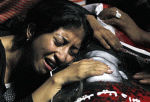22 February 2012
A New Year of ‘Dhimmitude’ for Egypt’s Copts
 For Egypt’s Christian Copts, the New Year began with threats that their churches would be attacked during Christmas mass (celebrated on January 7).
For Egypt’s Christian Copts, the New Year began with threats that their churches would be attacked during Christmas mass (celebrated on January 7).
Because many were eyeing the situation—several Coptic churches were previously attacked, including last Christmas (eight dead) and New Year’s day (23 dead), not to mention ominous harbingers around the world, such as the Nigerian Christmas day church bombings (40 dead) —the Muslim Brotherhood proclaimed it would “protect” the Copts during their church services. Happily, Coptic Christmas came and went without incident.
Yet, if the Muslim Brotherhood “protected” Coptic churches when many around the world were watching, as soon as attention dissipated, it was business as usual: a large number of Salafis and Muslim Brotherhood members entered a church, asserting that it had no license and no one should pray in it, with hints that it might be turned into a mosque—an all too typical approach in Muslim countries where building or even renovating churches is next to impossible.
More to the point, 2012 appears to be unfolding as the “year of dhimmitude” for Egypt’s Christians. Consider the following anecdotes starting from just last January, all of which demonstrate an upsurge in the treatment of Egypt’s Copts as dhimmis (dhimmi being the legal term for Islam’s “protected” non-Muslim minorities—“protected,” that is, as long as they agree to a number of debilitations that renders them second-class citizens):
Insulting Islam
According to the Pact of Omar (which is also one of the earliest sources banning the construction or renovation of churches), dhimmis must “respect Muslims” and never insult them or their religion. Accordingly, a prominent Christian, Naguib Sawiris, is charged with “contempt of religion” for twittering a cartoon of a bearded Mickey Mouse and veiled Minnie: “The case has added to fears among many that ultraconservative Islamists may use their new found powers to try to stifle freedom of expression.” Nor are the double standards in Egypt’s “contempt of religion” law missed: Christianity is daily disparaged in Egypt with impunity.
Likewise, a 17-year-old Christian student accused of posting a drawing of Islam’s prophet on Facebook—which he denies, saying it was posted without his permission—triggered days of Muslim violence and havoc, including the burning of three Christian homes to cries of “Allahu Akbar.” The student, who was beaten, is to be “held” for fifteen days, “pending investigation.” Muslim leaders agree “that priests should publicly apologize for the images, and that the student as well as his family should move out of the governorate.”
Conversion Issues
Also according to the Pact of Omar, dhimmis “shall not prevent” any of their family members from converting to Islam. Accordingly, some 20,000 Muslims just attacked a Coptic church, demanding the death of its pastor, who, along with “nearly 100 terrorized Copts sought refuge inside the church, while Muslim rioters were pelting the church with stones in an effort to break into the church, assault the Copts and torch the building.” They did this because a Christian girl who, according to Islamic law, automatically became a Muslim when her father converted to Islam, fled her father and was rumored to be hiding in the church. This would not be the first time in recent months that churches are attacked on similar rumors.
Collective Punishment
Traditionally, if one dhimmi transgressed, all surrounding dhimmis were collectively punished. As the jurist al-Murtada writes: “The agreement will be canceled if all or some of them [dhimmis] break it”; another jurist, al-Maghili taught that “the fact that one individual (or one group) among them has broken the statute is enough to invalidate it for all of them.”
Accordingly, a mob of over 3,000 Muslims attacked Christians in an Alexandrian village because a Muslim barber accused a Christian of having “intimate photos” of a Muslim woman on his phone (Sharia bans non-Muslim men from marrying Muslim women). Terrified, the Christian, who denies having such photos, turned himself in to the police. Regardless, Coptic homes and shops were looted and set ablaze. Three Christians were injured, while “terrorized” women and children, rendered homeless, stood in the streets with no place to go. As usual, it took the army an hour to drive 2 kilometers to the village: “This happens every time. They wait outside the village until the Muslims have had enough violence, then they appear.” None of the perpetrators were arrested.
Continue reading page: 1 2
http://frontpagemag.com/
21:04 Posted in Egypt | Permalink | Comments (0) | ![]() Facebook |
Facebook |



















The comments are closed.